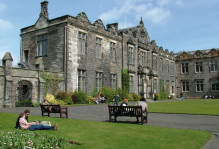Econ Made Sexy
We’ve discussed in previous blog posts that participating students in the St Andrews William & Mary Joint Degree Programme are afforded the opportunity to enjoy the breadth of study from a traditional liberal arts education while focusing on a depth of intense study generally only found on the American graduate school level. This same balance is apparent in the Economics Program of the Joint Programme, however, the two institutions’ unique academic approaches are more alike in this social science than in the English, International Relations, and History programs. The sequence of classes, topics taught, and basic economic theories are similar enough that students will jump from one side of the Atlantic to the other with academic ease.
What exactly makes the programs so similar? As the theory of economics has evolved over the past thirty years, international perspectives on the discipline have convened in a manner which produces common approaches to teaching and generally accepted theory across the globe. In this case, students at W&M and students at St Andrews are already studying similar material in a similar manner without our two schools ever deciding to forge this union. If the curriculum is so similar, than why participate in the joint programme? If you’ve read our three previous blogs you know that I’m going to answer that question. Here goes!
If you’ve read the previous blog posts you also know that traditional St Andrews students would focus on economics, leaving little time to enjoy dabbling in other disciplines. You also already know that the W&M student is going to experience just the opposite with economics making up only a one third of his or her academic time. This depth of intense study plus the ability to take liberal arts courses at W&M is step one as to why these two similar programs will still create a unique experience through their combined powers. The second reason lies in the fact that the economic elective focus is different at both institutions. St Andrews provides expertise in dynamic macroeconomics, finance, household economics, competition, innovation and climate change. W&M offers strengths in health, experimental and international economics. This course variety added to a sound economics foundation will likely produce scholars with a broad knowledge of economics and a passion for specific aspects of the field of study not normally available in their traditional learning environment.
The Economics students will also benefit from the incentives available to all Joint Degree students which will hopefully better prepare them for both graduate study and career placement. These incentives include guidance from several program advisors and staff beginning the summer before freshman year, priority placement in popular courses, and the ability to participate in lectures, lunches, seminars, etc. specifically for St Andrews W&M Joint Degree Programme students. These students will also be the first of the four programs to benefit from taking courses together with their cohort throughout the four year experience, creating an environment of mutual intellectual growth and scholarly debate. These students will be better prepared and more competitive for graduate schools on both sides of the Atlantic as they have completed a Senior Honors Thesis (W&M) or Honors Module Thesis (St Andrews.) Completion of these lengthy research endeavors will provide them with the chance to be published on the undergraduate level, engage in intense and mentored research and experience the satisfaction of conducting unique and individual research pertinent to a field in which they are passionate.
Looking past the day when these first Joint Degree students will switch their tassels from one side of the mortar board to the other might be difficult when high school graduation seems years (not months) away. We understand. Hopefully, these blogs are helping applicants to understand that this unique program is an amazing opportunity to experience another culture, to learn where great and famous minds have learned, and to challenge oneself with the experience of foreign exchange. It is also the chance to develop analytical, research and intellectual skills within a specific discipline while not sacrificing all the varied and traditional experiences a liberal arts education has to offer.
Admit It! After reading this blog, your interest in the Joint Degree Programme may have exceeded my current supply of information. If so, please contact myself or the progam advisors.
Contributed by:
Amanda Norris ’07
Former Assistant Dean of Admission


No comments.
Comments are closed on posts older than one year, but we still want to hear from you. If you have a comment or question for us, please email admission@wm.edu.